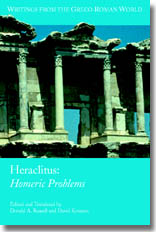SBL Press Bookstore

Heraclitus: Homeric Problems
Donald A. Russell, David Konstan, Donald Russell
ISBN
9781589831223
Volume
WGRW 14
Status
Available
Price
$23.00
Publication Date
November 2005
$23.00
Donald A. Russell is Emeritus Professor of Classical Literature, University of Oxford, and Emeritus Fellow of St. John’s College, Oxford. He is the editor and translator of Quintilian: The Orator’s Education (Harvard University Press), the editor of Libanius: Imaginary Speeches (Duckworth) and Longinus Libellus de Sublimitate (Oxford University Press), and co-editor of Ancient Literary Criticism: The Principal Texts in New Translations (Oxford University Press).
David Konstan is the John Rowe Workman Distinguished Professor of Classics and Professor of Comparative Literature at Brown University. He is the translator of Simplicius on Aristotle’s Physics 6 (Cornell University Press and Duckworth) and the author of numerous books, including Greek Comedy and Ideology (Oxford University Press), Friendship in the Classical World (Cambridge University Press), and Philodemus: On Frank Criticism (co-author; Society of Biblical Literature).
“Donald Russell and David Konstan, world-renowned experts in ancient rhetoric, literary theory, philosophy, and later Greek prose, have put us all in their debt by providing what is, on balance, the best Greek text of the treatise that is currently available, a lively and sensitive translation into clear but elegant English, a basic apparatus of textual and explanatory notes, a wide-ranging and up-to-date introduction, and a helpful introductory bibliography. The volume will be of enormous help to students (and their teachers) of classics, comparative literature, biblical studies, and many other fields.”
—Glenn W. Most, Scuola Normale Superiore di Pisa and the University of Chicago
“Russell and Konstan have produced a wonderful translation of a work that contains something of interest for every classicist and makes an excellent introduction to the important themes it takes in. [Heraclitus] emerges as an important witness to the confluence of literary, rhetorical, and philosophical thought in the intellectual ambience of the early Roman Empire.”
—George Boys-Stones, Department of Classics and Ancient History, University of Durham
